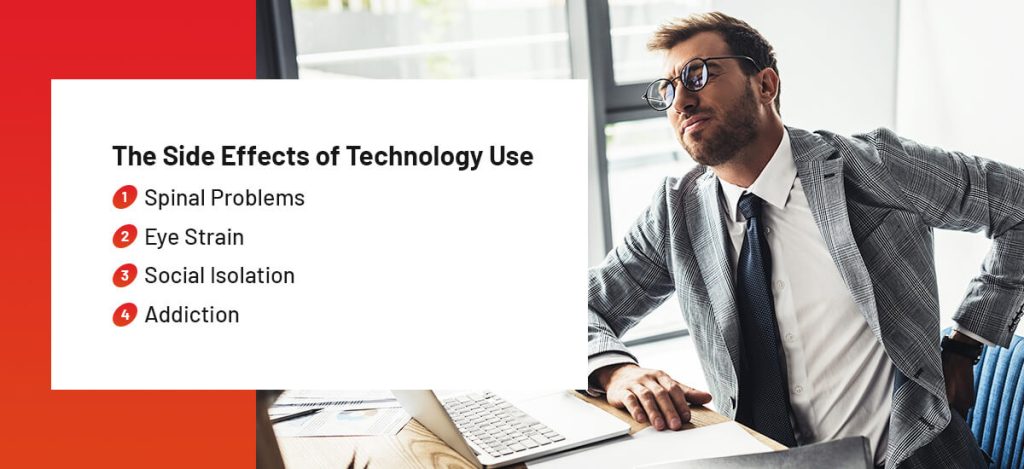Technology has revolutionized the way we work, communicate and entertain ourselves. However, the constant use of devices like computers, tablets and smartphones has led to a rise in health issues related to poor posture and spinal issues. Prolonged sitting, hunching over devices and carrying heavy bags can all contribute to muscle strain, neck pain, back pain and even spinal problems in the long run.
Join us here as we explore the spinal health concerns of using technology and provide tips on maintaining good spinal health in an increasingly technological world.
One of the main ways that technology use impacts spinal health is through poor posture. Computer, laptop or tablet use typically occurs while seated. When we spend extended periods sitting or hunching over a screen, our body weight compresses the spine and puts pressure on the lower back. This pressure can lead to muscle strain, back pain and even spinal problems in the long run.
People may also experience posture issues from cell phone use. Hunching over devices like smartphones can strain the neck and shoulders, leading to a condition known as “text neck.” This condition can cause headaches, neck pain and even shoulder pain. Moreover, the small screen size of these gadgets can cause users to squint and strain their eyes, compounding headaches and neck pain.
Technology use can negatively impact spine health even when the screens aren’t directly in front of us. Transporting heavier devices like laptops and their accessories to and from work or school in bags or backpacks can stress the spine and supporting structures. Carrying heavy loads on one shoulder can cause our spines to curve unnaturally, leading to muscle strain and back pain.
Technology is an integral part of our daily lives, and while it’s brought numerous benefits, it’s also led to various side effects. Prolonged technology use can negatively impact our physical and mental health, affecting everything from our posture to our sleep patterns.

The sedentary behavior and slouching often associated with technology use can affect our posture. But poor posture does more than look bad — it can contribute to spinal problems such as herniated discs and pinched nerves.
A herniated disc, sometimes called a bulging or slipped disc, happens when a spinal disc’s gel-like center bulges outward through a hole in the tougher outside and compresses the spinal cord. Pinched nerves occur when bones, cartilage, muscles or tendons apply too much pressure to a nerve, causing pain, tingling, numbness or weakness.
Technology use can also damage our eyesight. Staring at a screen for long periods can strain the eyes, leading to blurry vision, eye fatigue and headaches. Moreover, screens emit blue light that can disrupt our sleep patterns, making falling and staying asleep difficult.
Another side effect of technology use is social isolation. While technology has made it easier to connect with others, that connection occurs through a screen rather than a face-to-face interaction. Some people have come to rely on this form of disconnected connection because there’s less pressure to look or act a certain way when the person you’re interacting with isn’t physically with you. Unfortunately, this social isolation can lead to feelings of loneliness and depression, which can take a toll on our mental health.
Finally, technology use can be addictive. The constant notifications and instant gratification provided by social media and other apps can lead to a compulsion to check devices even when we don’t need to. This compulsive behavior can lead to stress, anxiety and decreased productivity.
Poor posture, eye strain, social isolation and compulsiveness are just a few of the negative impacts of technology use. It’s important to be aware of these side effects and take steps to mitigate them so you can enjoy the benefits of technology while preserving your health and well-being.
Wondering how to keep your spine healthy while using a computer, laptop, tablet or smartphone? Check out our tips below!
While the impressive technology of today’s smartphones, tablets and computers has benefitted society tremendously, prolonged use can contribute to spine problems and many other adverse side effects. Fortunately, being mindful of technology use and maintaining good posture and spinal health can help reduce the risk of developing these issues.
If you’re suffering from back or neck pain related to technology use or another injury or illness, the expert spine surgeons at the Desert Institute of Spine Care (DISC) may be able to help. We treat a variety of spinal conditions using the latest, most minimally invasive procedures and techniques. Get in touch with DISC today to schedule a consultation with a specialist.
